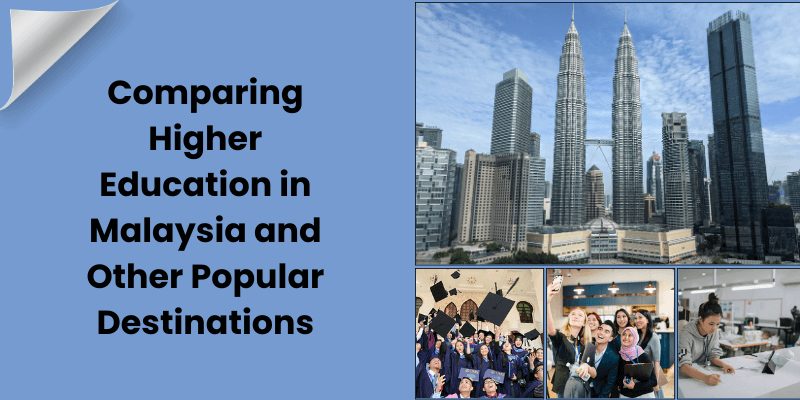Comparing Higher Education in Malaysia and Other Popular Destinations
February 12, 2024
Anis

Entering a higher education institution marks a transformative phase in individuals' lives, shaping their academic, professional, and personal growth.
Did you know that nowadays, it's easier for students to study across borders, offering them a wide array of options for their tertiary studies?
Malaysia particularly stands out as a favorable destination for academic pursuits due to its diverse academic programs, affordability, and high-quality educational offerings.
However, the decision to pursue higher education abroad requires careful consideration, as students must navigate through many factors that shape their academic journey.
What sets Malaysia's higher education landscape apart?
The importance of higher education cannot be overstated. It serves as a gateway to expanded knowledge, critical thinking skills, and enhanced career opportunities, playing an important role in shaping individuals' futures.
Now, let's explore what distinguishes Malaysia's higher education landscape as a popular education destination for international students.
1. Quality of education

Malaysia's higher education institutions are renowned for their relentless pursuit of academic excellence, placing them on par with leading educational destinations worldwide.
With rigorous curriculum standards, universities and colleges in Malaysia provide students with a conducive learning environment comparable to renowned institutions abroad.
This environment not only encourages critical thinking and fosters innovation.
It also offers practical experience through research projects and collaborations with local and international industries, mirroring the hands-on learning experiences offered by the universities.
Furthermore, higher institutions in Malaysia are committed to improving teaching methods, ensuring graduates have the latest knowledge and skills needed in the global job market.
This effort positions them competitively alongside graduates from prestigious universities worldwide.
Malaysia's higher education system demonstrates its steadfast dedication to providing students with exceptional education, supported by international accreditation and recognition.
Additionally, universities in Malaysia offer assistance to international students by conducting English preparatory classes to improve their proficiency.
This is crucial as English is the primary language of instruction in Malaysian universities. With this support, students gain confidence and can overcome language barriers when their classes begin.
2. Tuition fees
Universities in Malaysia offer another advantage that make them popular education destinations for international students.
One such advantage is their reasonable tuition fees compared to many other educational destinations worldwide, making Malaysia appealing for students seeking quality education at a more affordable cost.
| Program | Tuition fee |
|---|---|
| Business Studies | USD 3000-6000 per year |
| Computer Science | USD 3000-6000 per year |
| Engineering | USD 4000-7000 per year |
| Medicine (MBBS or MD) | USD 18000-30000 per year |
| Nursing | USD 4000-5000 per year |
| Pharmacy | USD 18000 - 30000 per year |
| Others | USD 3000-7000 per year |
Additionally, higher institutions in Malaysia provide partial scholarships, grants, and financial aid options to international students, ranging from 10% to 50% discounts on tuition fees.
These financial supports significantly alleviate the financial burden of tuition fees, making higher education more accessible to a diverse range of students.
Despite the lower tuition fees, universities in Malaysia maintain high academic standards, offering a wide range of programs accredited by reputable international bodies.
This ensures that students receive a quality education recognized globally.
This combination of affordability and academic excellence makes Malaysia an attractive destination for those seeking value for money in their higher education experience.
3. Cost of living
The cost of living in Malaysia for international students differs from other education destinations in several ways.
Malaysia generally offers a lower cost of living compared to many other popular education destinations, such as the United Kingdom.
Expenses for accommodation, food, transportation, and leisure activities are often more affordable in Malaysia, making it a cost-effective option for international students.
Also read: Cost of Living in Malaysia for International Students
4. Cultural experience in campus
The cultural experience on campus in Malaysia offers international students a diverse environment, setting it apart from other education destinations.
Malaysia's unique blend of Malay, Chinese, Indian, and indigenous influences creates a rich tapestry of cultural experiences.
Additionally, universities in Malaysia, especially private ones, often host a higher number of international students, fostering a vibrant and inclusive community during their stay.
This enables international students to interact with peers from different countries, enriching their cultural experience.
Furthermore, Malaysia celebrates a variety of cultural festivals, including Eid al-Fitr, Chinese New Year, Deepavali, and Christmas.
These celebrations provide international students with the opportunity to participate in traditional rituals and experience diverse customs, further enhancing their cultural experience.
Also read: The Cultural Experience of Being A Student in Malaysia
5. Opportunities post-graduation

Malaysia offers a range of opportunities for international students after they complete their studies, setting it apart from other education destinations.
This is due to Malaysia's strategic location and growing economy.It enhances its appeal as a business hub and provides a gateway to economic global opportunities and markets, such as Singapore and Australia.
The Malaysian job market is also distinguished by the presence of multinational companies (MNCs) spanning various industries.
These MNCs create diverse job opportunities and further enhance Malaysia's appeal as a destination for international students seeking career opportunities after completing their studies.
To work in Malaysia, international graduates need an Employment Pass, which is a work permit allowing them to work under a Malaysian company.
The process involves securing a job at a company in Malaysia, after which the employer applies for the work permit on the graduate's behalf, based on certain eligibility and pass types.
This step cannot be done independently by individuals.
Additionally, the experience of working in Malaysia allows international students to acquire practical knowledge and skills that can benefit them upon their return to the home country.
This hands-on experience enhances their professional capabilities, preparing them to address challenges and drive innovation in their home countries' industries.
Furthermore, the opportunity to work in Malaysia empowers international students to establish professional networks and connections within the global business community.
These connections facilitate cross-border collaborations and partnerships, allowing graduates to bring back valuable insights, resources, and opportunities to their home countries.
6. Application and admission process
International students typically apply to universities in Malaysia through several methods, such as:
a) Direct application
International students can apply for universities in Malaysia directly to their institution website. They are required to fill out this form with accurate personal and academic details.
Additionally, applicants need to prepare and submit the necessary supporting documents.
These supporting documents include academic transcripts, language proficiency test scores, letters of recommendation, and a personal statement.
Once completed, the application is submitted directly to the university's admissions office through the online portal.
Direct application provides students with more control over their application process and allows them to communicate directly with the university regarding any inquiries or updates.
b) Through authorized representatives
Alternatively, international students have the option to apply to Malaysian universities through authorized representatives.
These agents act as intermediaries between the students and the universities, providing guidance and support throughout the application process.
Students may choose to work with agents for various reasons, such as language barriers, unfamiliarity with the application procedures, or seeking personalized advice on university selection.
These representatives offer assistance in understanding the application requirements, compiling necessary documents, and ensuring that all submission deadlines are met.
They also provide valuable information on visa requirements, accommodation options, and other aspects of student life in Malaysia.
Also read: Ultimate Study in Malaysia Guide For International Students
Kickstart your education in Malaysia
We'll help you find and apply for your dream university
You might be interested in...
- Raising Awareness of the Threat of Microplastics Pollution on International Mother Earth Day
- Essential Tips for International Students Studying in Malaysia's Big and Suburban Cities
- Misconceptions About Studying in Malaysia: Insights for International Students
- The Role of Education in Promoting Health Equity: Lessons from World Health Day 2024
- Studying Abroad Tips: What Should You Do Before Coming to Malaysia?
- International Students' Guide to Success in Malaysian Research Programs
- Returning Home or Staying Put: Planning Your Career Path After Studying in Malaysia
- Crafting a Greener Tomorrow: Empowering Change through Zero Waste and Upcycling Practices
- Malaysian Higher Education's Global Outreach: Collaborations with International Institutions
- Initiatives by Universities in Malaysia to Prepare Students for Globalization








